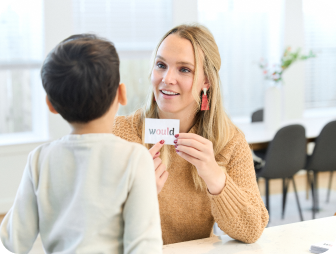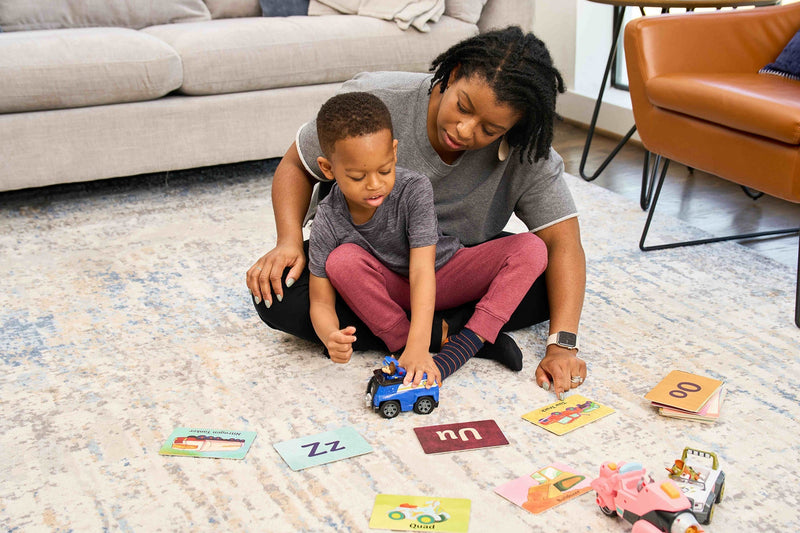Does Educational Screen Time Help Kids Read?
Any parenting board, toddler influencer, or internet stranger you come across will have an opinion on educational screen time.
And usually, those opinions are strong. People who hate educational screen time really hate it, and people who support using educational screen time really support it.
So if you're here expecting me to say that all of these people are right and those people are wrong, you're going to be disappointed by this blog.
When it comes to screen time, I'm not going to give you a definite yes or no answer because—like most parenting decisions—it's just not that black and white.
So if you've been following me for a while, you know I will always be honest with you. I won't tell you something just because it's what you want to hear. I will tell you what I think is best for your little one and let you decide if what I'm saying makes sense.
What's happening in a child's head during educational screen time?
To understand the effects of screen time, we first have to understand what's going on in our little ones' brains when they're in front of a screen.
So here it is: A screen will always be more visually stimulating than a book.
There will be things that light up and move around, pictures that are interesting to look at, and videos where the visuals are constantly changing. Everything is VERY intentionally designed to keep your little one's eyes on the screen.
The auditory stimulation? That's also on purpose, like buttons that make noises when they interact with the screen and songs that play over and over until they know them by heart.
And this is no accident. Companies pay LOTS of money to make sure children don't want to do anything other than stare at that screen.
These bits of stimulation are happening immediately and changing continuously. Check out this example from KidsPlay and notice how many stimulation points you notice in just the first 10 seconds alone.
When THIS is what our children are used to, then anything that is NOT this will have a much harder time keeping their attention.
What are the benefits of screen time?
So, if we know that screen time is intentionally designed to keep our kids hooked and always wanting more. Are there any positive benefits to that time in front of the screen?
Benefit 1. They're having fun!Because they're so stimulated, they're also enjoying the screen time.
Their brains are so focused on getting to the next level, finishing the next story, or coming in first place in the game that they don't have time to pay attention to anything else.
Achievement on these apps, as silly as it might seem to us as adults, does give our kids a feeling of accomplishment. How often have you heard your child excitedly explain that they reached a new level or came in first place on their favorite game?
These games also give our little ones a feeling of control. In real life, most children don't have much say in how they spend their time, the clothes they wear, or what they eat for dinner. But when they're on a screen, they have so many choices.
They can create their own avatars to personalize their experience or pick the game they want. Having so many choices makes them feel good.
Benefit 2. It exposes them to educational content.Sure, the likelihood that a program is going to teach your child their letter sounds is very low. But educational screen time also gives kids the opportunity to become more familiar with educational content.
Even if listening to a song about the alphabet doesn't teach your kids how to read, they might at least have a better idea of what letters are.
This will also give you a chance to have conversations with your little ones about academic subjects and potentially even help them develop an interest in them.
Benefit 3. It can give you back some time.Obviously, we don't want screens acting as babysitters for our kids.
But if we as parents literally just need a break or need time to work with another child, screen time can provide us with an opportunity to regroup, refocus, and be better for our kids.
So if a few minutes is all you need to come back and be the engaged, attentive parent you are, then, by all means, take that time.
Now, if these educational apps are stimulating, fun, and engaging... what are the downsides?
Why should you cut educational screen time?
Like I said before, decisions around screen time are not black and white. So now that I've acknowledged what's helpful about screen time let's consider the downsides as well.
Reason 1. It can be OVER stimulating.Think about the difference in stimulation between a screen and a traditional book.
The screen is going to have flashing lights, moving images, and sound effects.
And sure: a book might have colorful pictures, but there are no flashing lights or moving pictures. There are no sound effects or rewards for finishing.
So if a child becomes too used to the amount of stimulation they get from an app, they might struggle to regulate their behavior when the screen is turned off.
I've worked with plenty of these kids; they're super focused and in control when working on their iPad or computer but have trouble staying calm when it's taken away. And when they aren't getting the stimulation from the screen, they find it elsewhere by moving around and engaging in all sorts of behavior that makes the learning time much more challenging.
Reason 2. They might be bored when the screen is taken away.Similarly to the first trade-off, too much screen time can make offline learning feel less exciting.
If your little one is used to the excitement and stimulation that comes with screen time, it can be harder to build engagement during traditional learning time.
Unlike online apps and games, traditional learning doesn't usually include lots of incentives for your little one to stay focused. If your child is used to having their attention reactivated every 2-3 seconds on their app, they might struggle to focus for more than a few seconds (or refuse altogether) when you work with them 1-on-1.
This can also play out in the classroom; learning apps are designed to be individualized, with tons of choices at every stage. If this becomes the norm for your child, they may struggle when put in a classroom setting where they'll have less control, less stimulation, and are asked to focus for longer periods of time.
Reason 3. The teaching won't be great.Like I said, certain educational apps and websites can potentially expose our little ones to academic subjects that can foster a love of learning.
But what virtually all of them can't do is teach your child.
And if I've said it once, I've said it a thousand times: Things don't teach kids; people do.
There's a big difference between knowing an ABC song and being able to identify letter sounds. And being able to identify letter sounds requires direct phonics instruction that most apps and websites simply cannot give them.
So, how do I know what's best for my child?
Now that we've gone over the pros and cons of educational screen time, it's up to you to weigh the benefits and the drawbacks.
If you're still confused and having a hard time figuring out what's best for your child, here's a simple question to ask yourself:
Is my child becoming who I want them to be?
Even though it's a simple question, it's going to require you to be completely honest with yourself.
Think through the vision you had for your child when they were first born. How did you envision their behavior? Their emotional regulation? Their social skills? Their academic achievement?
If your child is on track to become the person you want them to be, whatever you're currently doing is working. You don't need to take the advice of any parenting "experts" (or me) to tell you how to raise your child if you're happy with how your child is growing and developing and interacting with the world.
But let's say one of your hopes for your child is that they grow into someone who is outgoing and social. If your little one avoids conversation with others at a restaurant and won't talk or engage with others unless they have a screen in front of them, it might be time to rethink the amount of screen time you're giving them.
But if your child makes friends easily and loves spending time with their loved ones, it's safe to say you can keep doing what you're doing.
Many times when parents turn to educational apps and games, it's because they want their little ones to learn at home but don't know where to start.
And that's totally understandable; teaching your child to read can be intimidating. But I promise, it really isn't as difficult as it seems.
If you're ready to get started and are looking for support, I've got you. I have a fantastic free training that's given thousands of parents the tools they need to get started.
Ultimately, there is no right or wrong. But there is more effective and less effective. So look at who your child is now. Look at how they're behaving. Look at what they're learning. Look at their focus and their attention, and be honest with what you see because that is going to be the biggest factor in determining how much educational screen time your child should get.
Still have questions? Jump in the free training and let me know! There's a live chat where we can talk more.









